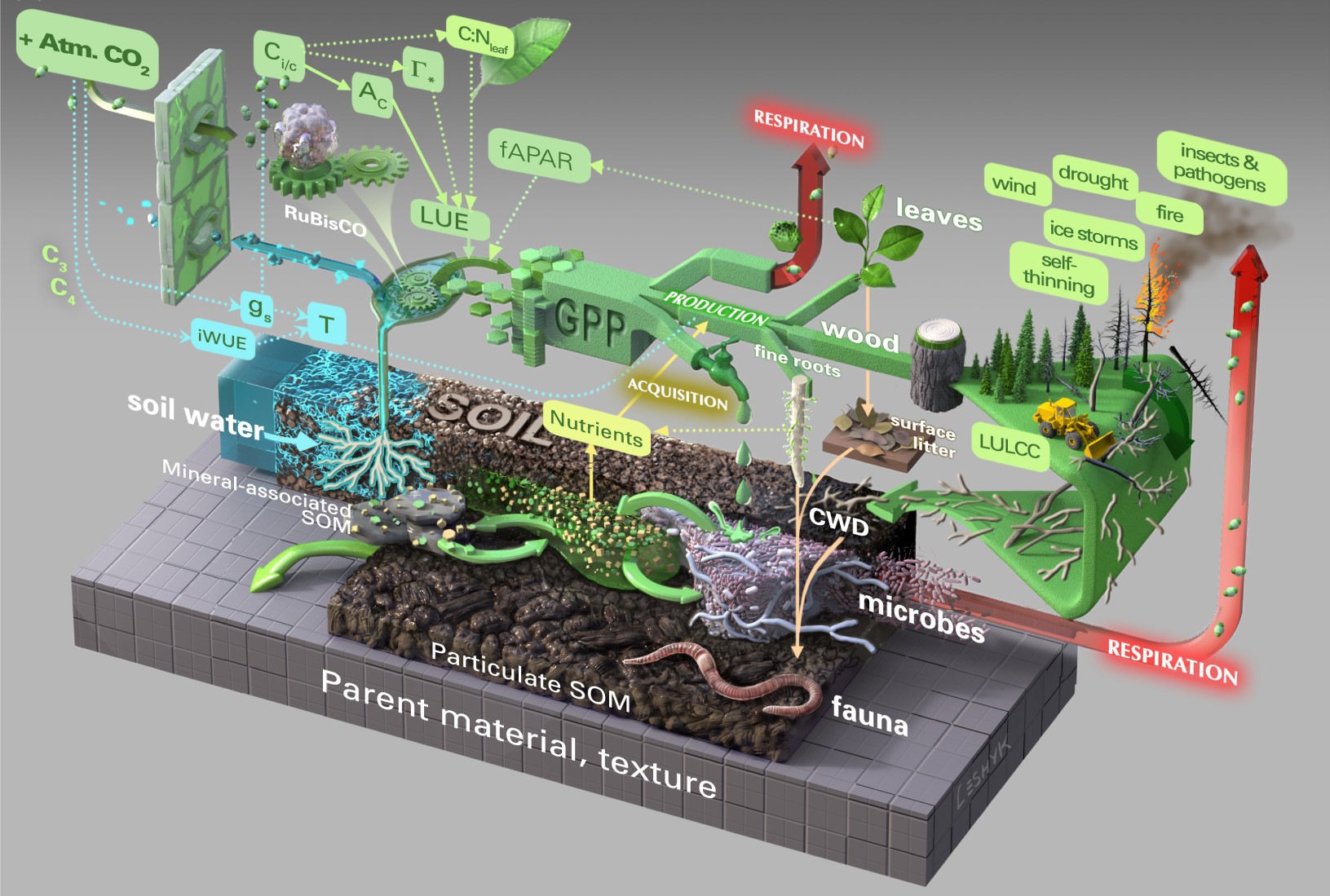August 12, 2020
Understanding Carbon Feedbacks: The Interaction of Atmospheric CO2 and the Terrestrial Carbon Cycle
Atmospheric CO2 interactions with terrestrial ecosystem carbon to influence CO2 emissions, and these interactions are complex and uncertain.

Conceptual diagram of landscape-scale carbon cycle and the influence of key multiscale and inter-connected process of eCO2 cycling. Solid arrows (3D and 2D) represent carbon flows, dotted arrows represent influence.
[Reprinted with permission from Walker, A.P., et al. “Integrating the Evidence for a Terrestrial Carbon Sink Caused by Increasing Atmospheric CO2.” New Phytologist 229, 2413–2445 (2021). © 2020 The Authors. © New Phytologist 2020 New Phytologist Foundation.]
The Science
The global responses of plants and soils to increasing atmospheric carbon dioxide are slowing the rate of climate change, but these responses are complex and process understanding remains unresolved. A large amount of data have been collected, but have never before been integrated. Evidence supports the idea that plants and soils store more carbon in response to increasing atmospheric CO2. However, the size of this response is uncertain, and other agents of global change (e.g., land cover change) are also important contributors. Despite uncertain size, this change in carbon storage is likely to decrease going into the future.
The Impact
The required climate-change mitigation efforts depend directly on the evolution of future terrestrial carbon storage. Researchers integrated observational evidence from forests, tree-rings, volcanic CO2 springs, atmospheric and ice-core measurements, satellites, and flux-towers with experiments to provide a robust foundation for future research into plant and soil carbon storage, a crucial ecosystem service. Developing this robust and integrated foundation of literature will enable the research community to better quantify historical carbon uptake, and more accurately predict future carbon uptake. Improved understanding will inform better natural resource and ecosystem service management.
Summary
Atmospheric CO2 is increasing, leading to climate change. Increasing CO2 also increases leaf-scale photosynthesis and water-use efficiency. These direct responses have the potential to increase plant biomass and soil organic matter, removing carbon from the atmosphere into terrestrial ecosystems (a carbon sink) and slowing the pace of climate change. However, ecosystem CO2-responses are complex or confounded, and evidence for a CO2-driven terrestrial carbon sink can appear contradictory. An international team of over 60 scientists, led by researchers at Oak Ridge National Laboratory, synthesized theory and broad, multidisciplinary evidence for the effects of increasing CO2 on the global terrestrial carbon sink.
Evidence for increasing terrestrial ecosystem carbon storage caused by increasing atmospheric CO2 indicates a highly valuable ecosystem service that effectively subsidizes fossil fuel emissions by slowing the rate of CO2 accumulation in the atmosphere. However, due to concurrent changes caused by other global change factors, the size of this subsidy remains unclear. Based on diminishing direct physiological responses, likely increasing nutrient limitations, increasing mortality, and other negative temperature-related effects, it is highly likely that increases in terrestrial carbon storage due to increasing atmospheric CO2 will decline into the future. A decline in this subsidy will result in accelerated climate change per unit of anthropogenic CO2 emissions.
Principal Investigator
Anthony Walker
Oak Ridge National Laboratory
walkerap@ornl.gov
Program Manager
Daniel Stover
U.S. Department of Energy, Biological and Environmental Research (SC-33)
Environmental System Science
daniel.stover@science.doe.gov
Funding
This research was funded by the Office of Biological and Environmental Research’s (BER) FACE Model-Data Synthesis project, within the U.S. Department of Energy’s (DOE) Office of Science. Lead co-authors were supported by Australian Research Council (ARC) Discovery Grant (DP190101823), NASA Terrestrial Ecosystems Grant 80NSSC19M0103, and the European Research Council (ERC) under the European Union’s Horizon 2020 research and innovation program (grant agreement No. 647204).
Related Links
- The effects of rising CO2 concentrations on terrestrial systems: scaling it up.
- Integrating the evidence for a terrestrial carbon sink caused by increasing atmospheric CO2.
References
Walker, A.P., et al. "Integrating the Evidence for a Terrestrial Carbon Sink Caused by Increasing Atmospheric CO2." New Phytologist 229 2413–2445 (2021). https://doi.org/10.1111/nph.16866.
Walker, A.P., et al. "Literature Synthesis and Modelling Data of Terrestrial Ecosystem Responses to Increasing Atmospheric CO2." ESS-DIVE (2020). https://doi.org/10.15485/1644687.

